- Home
- Evelyn James
The Monster at the Window Page 4
The Monster at the Window Read online
Page 4
“What do you make of all this so far Miss Fitzgerald?” Lord Howton asked.
Clara was still gazing at the sandstone facing of the tomb.
“So far, I cannot see how a man, living or dead, could be climbing out of his mausoleum night after night, which makes me think this is a red herring to distract us.”
“Ghosts hardly need worry about a thing like walls,” Lord Howton pointed out.
“Ghosts don’t decompose, as far as I am aware,” Clara countered. “In any case, all witnesses have suggested that they have encountered a flesh and blood man, not a spectre. No, I think the mausoleum is exactly what you stated, Lord Howton, an eyesore designed to remind you all of Harvey’s presence long after he was gone.”
Lord Howton sighed to himself.
“I think you ought to meet the rest of the family now. More eyewitnesses to this drama, perhaps their testimony will offer up a solution?” Lord Howton turned away from the mausoleum.
They walked back to the house across the damp grass.
“Does this spectre appear every night?” Clara asked.
“He has not missed a single evening,” Lord Howton nodded. “More is the pity.”
“And he has not offered a reason for his appearance?”
“Other than to disrupt the family and make us feel as though we are going mad? No. I sometimes think he stands there to make us feel guilty.”
“For what?” Clara asked.
“I don’t know precisely. For his death, perhaps? Harvey liked to play the misused younger brother, he maintained a tragic air about him which, oddly enough, certain women found hugely attractive. Of course, he had a lot of grievances towards my father, not least that he had failed to make arrangements for the estate to be split between us. Harvey was convinced that before my father died he had promised to change his will to divide the land between us.”
“And what do you think?”
Lord Howton twitched his lips into a wry smile.
“My father was a traditionalist, Miss Fitzgerald, he would no more have divided this estate than he would have bestowed it on his favourite gardener. He wanted to see the Howton line and name continue for many generations to come, that would hardly be achieved by splitting the estate in half,” Lord Howton paused. “However, he was a mean old goat and he may well have implied to Harvey that the estate would be divided to keep him quiet. He liked an easy life in his final years.”
“Harvey would certainly feel betrayed if that was the case,” Clara suggested.
“Hardly my fault, Miss Fitzgerald, though Harvey could find a way to twist everything into being my fault,” this seemed to amuse Lord Howton. “Harvey knew our father as well as I did. Still, I cannot be held responsible for things that were out of my power to control.”
“No, indeed.”
They were back at the doors of the drawing room. Clara paused.
“Which window does Harvey always appear at?” she asked.
Lord Howton pointed out the window next to her.
“There,” he said. “My daughters are much relieved he has never attempted to appear at the window which opens into the room. The one we left by. The catch on those is loose, you know, it would take no effort to break it.”
Lord Howton ushered them back through this set of tall windows, that served as doors to the terrace.
“You will stay for luncheon, Miss Fitzgerald?” Lord Howton enquired.
“Thank you,” Clara responded. “I would be delighted.”
“Then you may speak with the rest of the family,” Lord Howton nodded.
“In the meantime,” Clara said. “I would be most intrigued to see what you captured on your photographic plates last night Oliver?”
“Me too,” Oliver agreed. “Perhaps that will prove to you, Clara, that the dead are up and walking.”
“Perhaps,” Clara replied noncommittally.
Chapter Five
The Howton family consisted of Lord Howton, his wife, his three children and his stepmother. When they all came together for luncheon, it was apparent this was not a family who enjoyed each other’s company. There were grim faces all around and Clara did not think that was just because of the ‘resurrection’ of Harvey Howton. The glances that the members of the Howton clan gave each other as they entered and sat down, suggested they would much rather not be all together in the same room.
The luncheon had been organised at the instigation of Lord Howton. He was the patriarch of the family and what he said was what was done, no arguments or excuses. Lord Howton was old-fashioned and conservative. He believed that a lord should hold himself to a higher standard than the rest of society. He was above the rest of the English population because of a fluke of birth, but that did not mean he should squander the privilege he had been given. He had to conduct himself with dignity and grace. He must display only worthy qualities and, when every other man was struck down by fear, or despair, so a lord must be the one to stand apart and to keep his head.
These ideals he instilled in his children forcibly; from childhood they had been expected to behave perfectly at public occasions, to treat the servants appropriately and respectfully, and to live a life worthy of the great honours and advantages bestowed on them. It was an exacting and exhausting regime. The children, as they grew, bridled at the restraints placed on them by their stoic father. They saw how their contemporaries lived their lives, even the offspring of other lords were allowed more freedoms than them. They saw the world changing, becoming more modern, the young behaving in a fashion their parents would have considered impossible at their age, and all the Howton children could do was watch this new exciting world slip by.
Lord Howton was immoveable on the subject. He was the typical, Victorian stiff-upper-lip, sort of father. His word was gospel, and there was to be no debate once a decision was made. In another man this determination to control his children and keep them to some out-of-date set of rules and preconceptions would appear pompous. Not so in Lord Howton. Clara found him quietly dignified and stern not out of unkindness, but because he felt the Howton title required him and his children to rise above the rest of the world and to hold themselves to greater account. He felt it as both privilege and burden, not something to be cast off lightly, or to be besmirched by carefree antics, as he witnessed among his fellow lords’ children. It was rare to see a holder of such an ancient title still gracious about the honour.
Of course, all this great wealth of patriotic and constricting emotion fell most heavily on Richard, Lord Howton’s eldest son. Richard was twenty-three, a handsome, slightly aloof, bachelor, who carried himself with a certain degree of arrogance – but then Clara was not seeing him at his most relaxed, he was on edge around her and his family. Richard was ‘heir to the throne’, so to speak. The idea both delighted and irritated him. There would be changes when he took over the title, something that his father realised and feared. Lord Howton, therefore, did everything in his power to mould his son into his own form, and had decided to live for as long as was humanly possible, in the hopes that age would dim Richard’s rebelliousness.
Richard had a worldly air, as Clara learned over lunch, this came from his time served in the Great War. Richard, as the son of a lord, had been granted the rank of captain at the tender age of 19. No prior military experience was considered necessary, he was heir to a title and thus he was naturally officer material. Richard had served through the last two gory years of the war. He had seen enough blood and mud to last a hundred men’s lifetimes. He had come back home hardened and scarred in ways no doctor or surgeon could heal.
Richard Howton seemed the last person likely to believe in corpses rising from the grave, and yet he was as convinced as his father that his uncle Harvey was not resting easy in his tomb.
“I’ve seen things, Miss Fitzgerald,” he explained to Clara, “men who should be dead who still live. There were parts of the trenches in France you never went alone for fear of what, or rather who, you might meet. I’ll neve
r simply dismiss such strange things out of hand, not after that.”
Richard was as convinced as his father. His sisters were another story. Genevieve Howton was older than her brother. Her slender features belied an iron will and a strong constitution. Genevieve was a countrywoman through and through; she went out shooting and was quietly considered the best shot in the neighbourhood. She rode with the local hunt and was a renowned fisherwoman. There was a stuffed carp of enormous proportions mounted on the wall of the billiards room which Genevieve had caught with her own fair hands.
Genevieve loved dogs and horses, and also pigs, of which she had three named Bubble, Squeak and Bacon. They were pets who she had taught a variety of amusing tricks and they could be routinely found wandering the house with the dogs, Genevieve proudly stating that they were better house-trained than most small children.
This passion for the outdoors contrasted with a complete disgust for the thought of a domesticated existence. Genevieve had revolted against all her parents’ plans to marry her off to some eligible bachelor. Now, at the age of twenty-six, she was rapidly becoming too old for the marriage market (suitable candidates largely looking for youth over substance) and this suited her just fine. Genevieve was confident, vivacious and a great talker. She had soon informed Clara of her own views on the ‘living corpse’.
“It’s all rot, you know. Someone dressing up as poor uncle Harvey to give us a fright. It is a horrible thing, quite ghastly. If father would allow I would go out with my shotgun and wing the fellow, then we would see what this ‘corpse’ was made of!”
Lord Howton point-blank refused this request of his daughter’s. No Howton girl was going to race outside after the supernatural, with or without a shotgun. This, he made it plain, was men’s business and the women were to stay inside.
Genevieve rolled her eyes at all this, but her sister, Diana, was more amenable to the suggestion. She did believe in ghosts and, as she told Clara, she thought the ‘thing’ tormenting the family meant them all harm, and she deemed it wiser to stay inside.
Diana was seventeen, a slightly naïve, innocent creature who had been shielded by her family from most of the ills of the world. She had been a sickly child, unexpected to live long, but had blossomed into a beautiful, if somewhat delicate, young woman. She was shy compared to her siblings, and prone to ducking her head if anyone asked her a question directly. Diana was rather an unknown quantity, as she kept her thoughts to herself and was difficult to draw on any subject into a definite opinion. Next to her two older siblings she was over-shadowed. She said very little during lunch and offered no insights into the drama affecting the family.
Diana’s reticence was not helped by her mother’s constant interruptions and attempts to talk for her when Diana was addressed directly. It seemed a habit on the part of Lady Howton, rather than an effort to prevent her daughter from speaking. Diana’s shyness clearly irritated her mother, who, lacking patience for the slow, thoughtful way her daughter answered any question, had taken to answering for her.
Lady Howton was much like her daughter Genevieve; strong, determined, resilient. She could stand up before a room of working class men and address them on any subject without any hesitation. If she was heckled, she heckled back, if someone was rude to her, she would swear at them like a trooper and (on one memorable occasion) had knocked a man’s lights out who had drunkenly insinuated her husband had a mistress.
Despite this force of character, Lady Howton was more inclined to her husband’s way of thinking when it came to the late Harvey Howton.
“Harvey was a great traveller, he went all over the world. Well, he could have picked up a trick or two from somewhere,” Lady Howton told Clara. “He always resented being the younger brother. I believe he found some sort of spell in one of those foreign places he visited, a spell that would resurrect him after death to enact revenge upon us.”
“He could not have known he was to drown, though?” Clara pointed out carefully.
“I don’t say he expected to die young, the spell would have acted at any time in his life. He was just the sort to want to carry on being a nuisance after his death. You know, he once told me during the war that if he were to die on the battlefield, he would most certainly come back and haunt us!”
It was plain Lady Howton had had no time for Harvey, despite him effectively growing up with her son. She saw him as a nuisance, best ignored. She held the same opinion now he was dead.
“Ignore him, he will go away,” was her final word on the matter.
That only left Angelica Howton, the previous Lord Howton’s second wife and mother to Harvey. She had sat and listened to the rest of the family’s opinions of her son in silence, her eyes cast down at her plate and her face giving away nothing of her emotions. Obviously, she had to be upset by what was being said. Her son was being painted as a vindictive rascal. Worse, she was listening to all this talk of his corpse walking, which had to be distressing to any mother. She remained stoical all the same, a habit she had long ago learned was best to safeguard her sanity and position among the Howtons.
Angelica had married the late Lord Howton when he was an old man. She was of an age more suitable for marrying his son, but she had accepted the old man’s marriage proposal without hesitation. Angelica did not come from money. She was the daughter of a station master on the Brighton to London line. Lord Howton had, one day, been travelling in the train and become unwell. Falling unconscious, he had been carried from the train at the station supervised by Angelica’s father. He was taken into the nearby station master’s house, where he was laid on a couch and a doctor summoned.
The verdict was that his heart had temporarily stopped. Fortunately for Angelica his heart had restarted itself. The old boy opened his eyes to see a divine angel nursing him, or so he put it in a letter to a friend. Lord Howton was deemed too delicate to be moved and remained at the house for a week. All that time he was looked after by Angelica and grew besotted with her. When he was well enough to be moved home, he swore to her he would be back. Within a month he was, bending creakily down on one knee and asking for her hand in marriage. Angelica accepted, apparently without hesitation. A cruel observer might have pointed out that it was a canny move on her part; his lordship was old and clearly suffering from heart troubles, how long would Angelica have to suffer him before nature would take its course and she would be left financially secure for life? It was certainly the view Lord Howton’s son and his wife took.
But the deal was done. Angelica moved into the great house and, within a year, the unimaginable happened – she gave birth to a son. Harvey had the potential to become the future Lord Howton, should his elder brother fail to produce an heir. There was a time of terribleness, the family was divided by the tension this birth had caused, until the following spring Richard Howton was born, and Harvey was once more cast into a secondary role.
All through their childhood the boys knew their respective places and developed a natural rivalry. They competed in everything, from party games to school exams. When war came, and both men went to serve, there had been an uneasy atmosphere in the house; what if Richard was to die? Harvey would become the next heir to the title once more. The tension between Lady Howton and Angelica became almost unbearable, the slightest hint of disaster for one was jumped upon by the other. As it happened, both boys survived the war, only for Harvey to perish in a completely ordinary and somewhat unfathomable accident.
Whatever reason had driven Angelica to marry Lord Howton – a desire for wealth, security or genuine affection – she could not have foreseen how miserable her life would become. At least while Harvey had been alive she had an ally, someone who was on her side, now she had no one.
Clara felt sorry for her. She looked an outsider. She now saw that most of the unhappiness that had surrounded the luncheon had been due to Angelica’s presence. She was hated by the others in a way that seemed unreasonable. But then Clara had not been witness to the many years of turmoil that
had led up to this point.
Angelica could not be drawn on the subject of her son’s supernatural return, even a direct question was pointedly ignored. Whether she was party to this game, or whether she was just dumb-struck by grief Clara could not say for the moment. It would be better to catch Angelica alone.
The luncheon concluded with no fresh clues to the problem at hand, though Clara felt she now had a fuller understanding of the family and their situation. Everyone was eager to depart the table as soon as they could, Lord Howton held them there a moment longer.
“I have decided to ask Miss Fitzgerald to investigate our problem,” he announced. “You will all give her your fullest cooperation. I expect nothing less.”
No one answered. As Clara rose from the table, Oliver appeared in the doorway of the room. He had been absent from the meal, excusing himself to develop the photographs he took the previous night. Now he came up to Clara and whispered in her ear.
“I’ve finished processing the pictures,” he said. “You best come look at them. You won’t be able to deny all this after you have seen them.”
Clara was not so sure about that.
Chapter Six
Oliver had created a makeshift developing room out of a closet in the servants’ quarters. The space was small and tight, not really enough room to turn around, and not room for two people. He asked Clara to wait outside while he retrieved the photograph.
“It was still drying,” he explained as he reappeared. “The edges are still a little wet.”
He presented the picture to Clara, clasping it with a pair of steel tongs from the kitchen. She carefully took the tongs so she could study the photograph closely. Clara moved under the main light in the hall.
The image was grainy, owing to the low light in the drawing room at the time it was taken. The flash had illuminated the darkened room so brightly that the edges of the photo had been lost in a foggy white haze. In the centre, framed by the burned-out sides of the picture, were the tall terrace windows. As Lord Howton had mentioned, they were not the ones that could be opened to act as doors. Clara found that interesting, why was the mysterious Harvey avoiding such an easy means of entry and exit? He could walk into the drawing room, if he chose, and come right up to the family rather than stand somewhat pathetically in the dark outside. Unless that was the whole point; perhaps if Harvey came too close, at least one of the family would see through his disguise? Or Genevieve might try to shoot him, or wrestle him to the ground. In either case, his real ‘substance’ would be revealed. And if he was an imposter, and the real Harvey truly was dead, then getting too close would risk a high chance of being discovered.

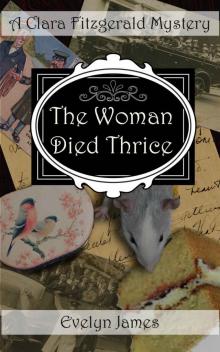 The Woman Died Thrice
The Woman Died Thrice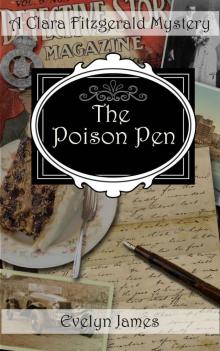 The Poison Pen
The Poison Pen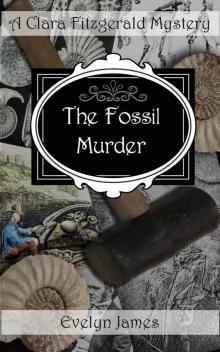 The Fossil Murder
The Fossil Murder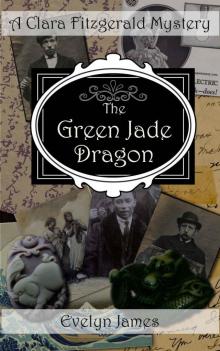 The Green Jade Dragon
The Green Jade Dragon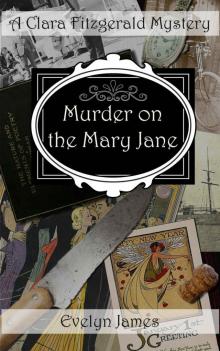 Murder on the Mary Jane
Murder on the Mary Jane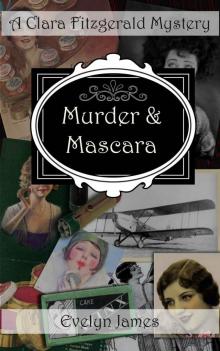 Murder and Mascara
Murder and Mascara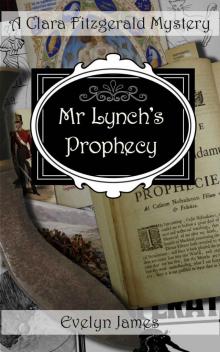 Mr Lynch's Prophecy
Mr Lynch's Prophecy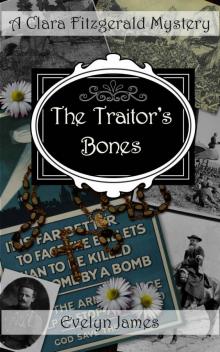 The Traitor's Bones
The Traitor's Bones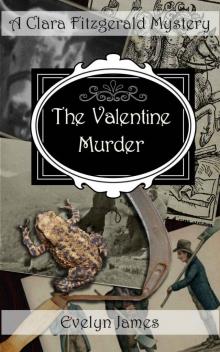 The Valentine Murder
The Valentine Murder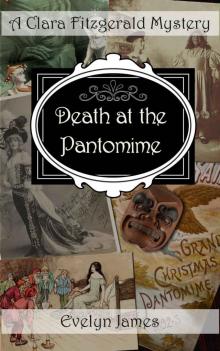 Death at the Pantomime
Death at the Pantomime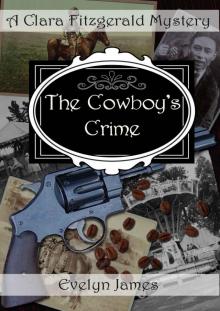 The Cowboy's Crime
The Cowboy's Crime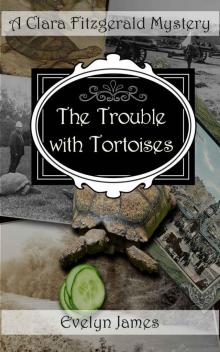 The Trouble With Tortoises
The Trouble With Tortoises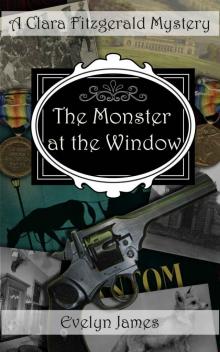 The Monster at the Window
The Monster at the Window